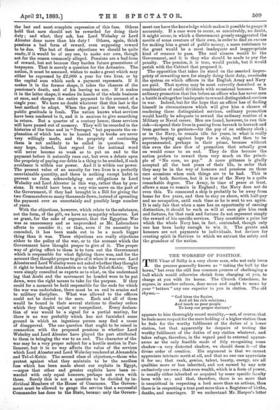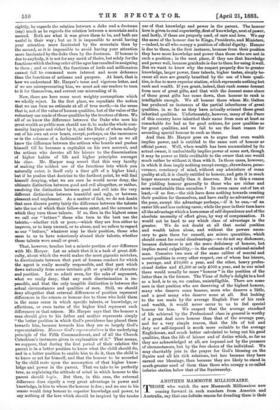THE WORSHIP OF POSITION.
THE Vicar of Selby is a very clever man, who not only laves the process generally known as " taking the bull by the. horns," but even the still less common process of challenging a bull which would otherwise shrink from charging at you, to charge at you with its horns. The Church Catechism, he argues, in another column, does mean and ought to mean by your " betters " any one superior to you in station. The old rhyme,—
" God bless the Squire, And all his rich relations; And teach us poor people To keep our proper stations,"
appears to him thoroughly sound morality,—not, of course, that he feels more respect for the mere holding of a higher station than he feels for the worthy fulfilment of the duties of a lower station, but that apparently he despairs of testing the worthy fulfilment of the duties of any station whatever, and takes refuge, therefore, in the regard paid to external appearances as the only feasible mode of fitly recognising some shadow—a very distorted shadow, we should deem it—of the
divine order of creation. His argument is that we cannot appreciate intrinsic merit at all, and that no one can appreciate it for us ; that rank, genius, talent, beauty, energy, are all qualities more or less inherited, and not earned by any acts exclusively our own ; that even wealth, which is a form of power, is usually either inherited or acquired by some specific faculty born with us ; and that, therefore, there is no more that is unspiritual in respecting a lord more than an artisan, than
there is in respecting a true poet more than a Registrar of births, deaths, and marriages. If we understand Mr. Harper's letter rightly, he regards the relation between a duke and a dustman (say) much as he regards the relation between a mountain and a mound. Both are what it was given them to be, and both are useful in their way ; but as it is impossible to avoid having your attention more fascinated by the mountain than by the mound, so it is impossible to avoid having your attention more fascinated by the duke than by the dustman. If honour is due to anybody, it is not for any merit of theirs, but solely for the functions which the long order of the ages has resulted in assigning to them ; and so viewed, the functions of lords and millionaires cannot fail to. command more interest and more deference than the functions of artisans and paupers. At least, that is how we understand Mr. Harper's terse and vigorous letter, and if we are misrepresenting him, we must ask our readers to turn to it for themselves, and correct our misreading of it.
Now, there are here some most weighty assumptions which we wholly reject. In the first place, we repudiate the notion that we can form no estimate at all of true merit,—in the sense that is, not of the value of human qualities, but of the value of the voluntary use made of those qualities by the trustees of them. We all of us know the difference between the Duke who uses his great wealth as public men should use it, to make the whole community happier and richer by it, and the Duke of whom nobody out of his own set ever hears, except, perhaps, on the racecourse or in the columns of a fashionable newspaper ; just as we all know the difference between the artisan who hoards and pushes himself till he becomes a capitalist on his own account, and the artisan who devotes all his leisure to the dissemination of higher habits of life and higher principles amongst his class. Mr. Harper may assert that this very faculty of making the noblest use of the functions into which you naturally enter, is itself only a finer gift of a higher kind; but if he pushes that doctrine to the farthest point, he will find himself denying, what we are sure he would never deny, the ultimate distinction between good and evil altogether, or rather, resolving the distinction between good and evil into the very different distinction between beautiful and ugly, or between pleasant and unpleasant. As a matter of fact, we do not doubt that men discern pretty fairly the difference between the talents into the use of which their fellow-men enter, and the account to which they turn those talents. If so, then in the highest sense we call our " betters " those who turn to the best use the talents,—whether rich or poor,—which they are free either to improve, or to keep unused, or to abuse, and we refuse to regard as our " betters," whatever may be their position, those who seem to us to have notoriously abused their talents, whether those talents were small or great.
That, however, touches but a minute portion of our difference with Mr. Harper. Let us admit that it is a task of great difficulty, about which the world makes the most gigantic mistakes, to discriminate between that part of human conduct for which the agent is really morally responsible, and that part which flows naturally from some intrinsic gift or quality of character and position. Let us admit even, for the sake of argument, what we really deny, that any such discrimination is impossible, and that the only tangible distinction is between the actual circumstances and qualities of men. Still, we should deny altogether that external differences of position represent differences in the esteem or honour due to those who hold them in the same sense in which specific talents, or knowledge, or affections, or even tastes of the higher kind represent such differences in that esteem. Mr. Harper says that the honour a man should give to his father and mother represents simply " the better position in which God's providence has placed them towards him, because towards him they are so largely God's representatives. Honour God's representatives is the underlying principle of the Fifth Commandment, and of all the Church Catechism's instances given in explanation of it." That means, We suppose, that during the first period of their relation the parent is in a better position to know what the child should do, and in a better position to enable him to do it, than the child is to know or act for himself, and that the honour to be accorded by the child rests upon the assumption of that higher knowledge and power in the parent. That we take to be perfectly true, as explaining the attitude of mind in which honour to the parent should begin. But then, in this case, the external difference does signify a very great advantage in power and knowledge, in him to whom the honour is due ; and no one in his senses would deny honour to superior knowledge and power, to say nothing of the love which should be inspired by the tender
use of that knowledge and power in the parent. The honour here is given to real superiority, first of knowledge, next of power, and lastly, if these are properly used, of care and love. We say the same of the honour due to Kings, Presidents, and Ministers, —indeed, to all who occupy a position of official dignity. Honour is due to them, in the first instance, because from their position they have more knowledge and power than those who-are not in such a position; in the next place, if they use that knowledge and power well, because gratitude is due to them for using it well. But we want to know why the respect properly due to greater knowledge, larger power, finer talents, higher tastes, simply because all men are greatly benefited by the use of these qualities, is due to mere superior station, which represents nothing but rank and wealth. If you grant, indeed, that rank means descent from men of great gifts, and that with the descent some share of those great gifts has come down, then honour to rank is intelligible enough. We all honour those whom Mr. Galton has produced as instances of the partial inheritanee of great qualities, in so far as they have actually evinced those great inherited qualities. Unfortunately, however, many of the Peers of this country have inherited their name from men at least as remarkable for bad as for good actions, for poor qualities as for great qualities, and we fail to see the least reason for according special honour to such as these.
And then Mr. Harper goes on to argue that even wealth implies power, and is entitled to the same sort of honour as official power. Well, when wealth has been accumulated by its actual owner, it undoubtedly implies power of some sort, though it may be power so little creditable to the owner that one would much rather be without it than with it. In those cases, however, in which it does imply nothing except energy, shrewdness, perseverance, constancy of mind, without any admixture of mean quality at all, it is clearly entitled to honour, and gets it in much larger measure usually than it deserves. But is this a reason for yielding honour generally to those who are richer -and more comfortable than ourselves ? In seven cases out of ten at least,—if so few,—the rich have done nothing towards creating their position for themselves, and have really no advantage over the poor, except the advantage perhaps,—if it be one,—of easier life and less carking cares; while the poor in their turn.have all the advantage which a keen sense of self-dependence and of. he absolute necessity of effort gives, by way of compensation. It would not be hard to say which class of advantage is the greater. We do not doubt at all that social position and wealth taken alone, and without the powers necessary to gain them for oneself, are minus quantities, which should count for social disadvantage,—we do not say dishonour, because dishonour is not the mere deficiency of honour, but implies moral culpability,—in the estimate of a rational-minded man. Conceive two men of the same calibre of mental and moral qualities in every other respect, one of whom has leisure, a peerage, and £10,000 a year, and the other, heavy professional duties and £1,500 or only £500 a year, and to our mind there would usually be more " honour " in the position of the latter than in the former. The Vicar of Selby's delight in a lord as a lord, is to us, we confess, unintelligible. There are some men in that position who are deserving of the highest honour, many who deserve some honour, more who deserve a little, and a good many who deserve none at all. But looking to the use made by the average English Peer of his rank and wealth, it would never occur to us to feel special honour for him. We suspect that the average standard of life achieved by the Professional class in general is worthy of a great deal more honour than that of the average peer, and for a very simple reason, that the life of toil and duty not self-imposed is much more suitable to the average Englishman, and much better calculated to bring out his good qualities, than the life of leisure and of duties which, so far as they are acknowledged at all, are imposed not by the presaure of circumstances, but by the free choice of the individual. We may charitably join in the prayer for God's blessing on the Squire and all his rich relations, but less because they have earned our blessings, than because they are likely to stand in much greater need of them than those who occupy a so-called inferior station below that of the Squirearchy.



































 Previous page
Previous page